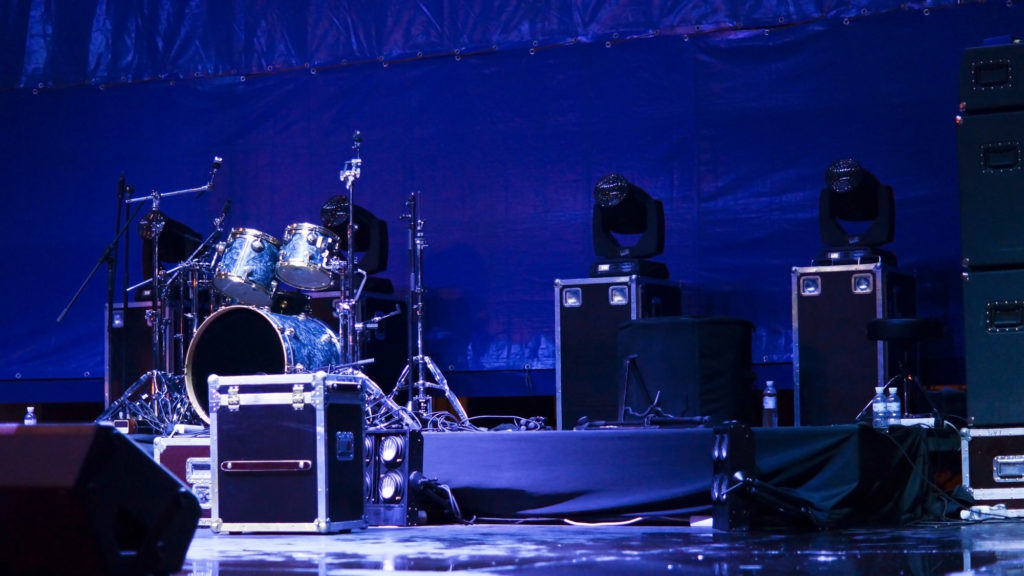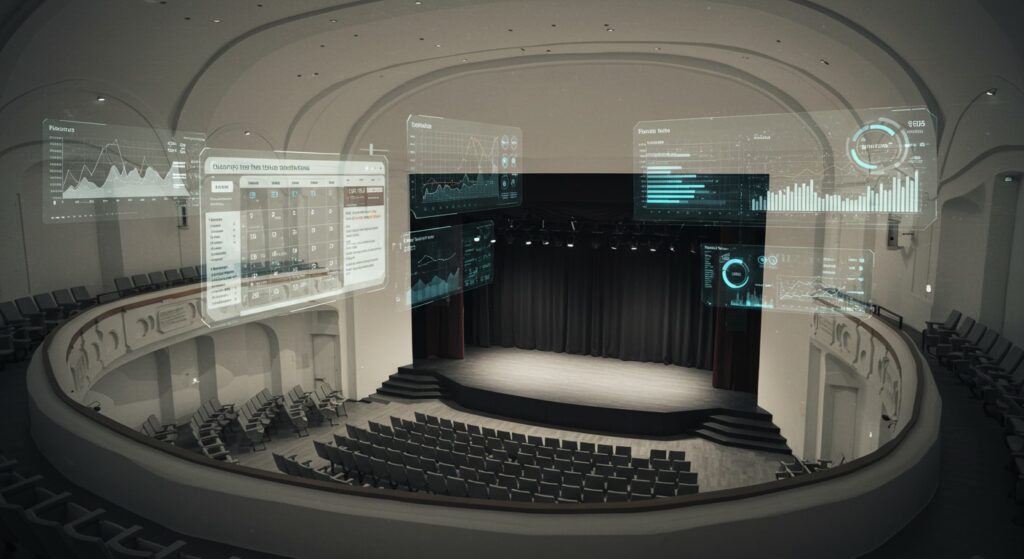
A Quick Guide to Concert Budget Breakdowns for Music Venues
A live event is one of the best ways to showcase musical talent. It serves as a platform to have one’s voice heard — literally and figuratively — and share feelings and experiences. After all, music has always been an outlet for self-expression.
But what many people don’t know is that behind the bright lights and upbeat tunes lies an open secret. Organizing a concert is no easy feat. It requires careful planning to develop a concert budget breakdown and navigate all the details of a fantastic event. Otherwise, it could end up becoming a major disaster.
One of the challenges promoters face is the need to project revenue by balancing sales with expenses accurately. This is why in today’s article, we’re providing a quick guide to concert budget breakdowns, starting with choosing an appropriate venue.

Concert Budget Breakdowns: The Importance of Choosing a Good Venue
Selecting the perfect venue requires careful thought because it can either make or break your event. When considering a concert budget breakdown, a good deal of your consideration will be venue related.
For audience members, the venue directly affects first impressions. How crowded, well-lit, fully-decorated, or accessible it is from their usual commute route are all thoughts they initially observe. And if they aren’t satisfied, it could greatly affect how engaged they are throughout the show.
When choosing a good venue, you need a careful balance of ambiance and practicality. The venue needs to be tailored to your target audience, their needs and experiences, and overall culture.
In more ways than one, it’s a microcosm of your entire live music event.
Things to Consider When Choosing a Live Music Venue
As we mentioned earlier, plenty of factors affect this decision. We won’t go through every one, just those most important. In our experience, these are the ones with the greatest impact on success.
Accessibility
Whether your audience is taking public transport or bringing their own cars, your venue must be reachable. People rarely spend several hours on the road (not to mention gas), traveling from one location to another, just for a concert.
To manage this issue, make sure the event has nearby train or bus stations for those commuting. Ample street parking is a must, too, for anyone driving. These are both simple ways of showing your clients that their well-being is prioritized.
Ambiance and Atmosphere
Another element to consider is the overall ambiance the location exudes. Are you going more for a casual and relaxed vibe or something structured and formal? Do you want people jumping around, seated, or standing on elevated tables?
In terms of decorations, consider if you’ll need any production work done. Installing banners and additional lighting fixtures often require trussing in place. Ultimately, it all boils down to how everything feels. Choosing an appropriate music venue that matches that will solve half your problems.
Availability of Equipment
Not all music venues have the necessary equipment. This includes musical instruments, strobe lights, a working sound system, and an LED wall. Rather than spend on these yourself, it would be more practical to find a location with all this already included. Besides saving you thousands of dollars, it also cuts your set-up time in half, so your team can focus on accomplishing other more critical tasks.
Budget
The final and perhaps, most important factor to consider is the cost. How much the rental will be for a particular music venue will directly impact your overall revenue.
Typically, the venue is the largest fixed expense to include in a concert budget template when planning an event. So when canvassing through options, make sure you already have an idea of your projected sales and expected audience turnout. This should provide a clear idea of the size and extravagance of your location.
As you do, also check if utilities like water and electricity are included in the total cost. The same goes for any hidden taxes. These may seem insignificant, but could greatly diminish your profit when accounted for only later on.
Other Costs to Consider
Besides the actual music venue rental, other expenses often go unnoticed. They are what we call incremental costs to planning a concert and are directly related to your chosen location.
To keep you ahead of possible issues, we’ve listed down some additional issues to watch out for.
- Events Permits – Remember that you may need approval from your local municipality or district for an event to happen. This includes permission for extraneous noise in the area, consumption of alcohol, or additional street parking–among others things.
- Added Security – Music events often draw large groups of people. Hiring additional security personnel is always a good idea to manage both their rowdiness and excitement. Bouncers and security guards serve as your front liners when keeping the peace, and ensuring that everything runs smoothly.
Moreover, if you’re collecting tickets, these are the guys who will make sure that only those who paid will get in. - Petty Cash – Unforeseen minor expenditures are expected. Sometimes you’ll need to buy light bulbs, wires, or an extra mic, right on the spot. So when preparing your budget, make sure to set aside a small amount in cash for such instances. Just make sure to keep all the receipts, so it’s accounted for later on.
- Marketing Collaterals – For your music event to be a hit, people need to be informed. This is where your marketing team plays a crucial role.
When advertising it, make sure to cover all mediums. This includes TV, radio, social media, and even print materials–depending on what suits your target audience best. If possible, hang up banners or posters all around your concert location. It will help create a festive atmosphere, while also serving as a locator for the event.
Of course, it’s easy to overspend when promoting the occasion. So use your budget as a guide, which usually takes up five-percent.
Tips When Choosing the Perfect Live Concert Venue
By this point, your brand is probably filled with information. But here we’ll share some helpful tips that should make the process more manageable.
Build Around Your Talent
As your show’s main attraction, it’s always a good idea to build around your talent, specifically the front act. Similarly, think about the type of crowd they’ll bring in. Will it be predominantly young or mature music lovers? Their age will help you identify where to hold the event.
Additionally, consider their genre, too. For instance, you would appreciate hearing a rock band play at a bar or outdoor location, while classical performers are better suited for a sit-down audience. For the latter, an auditorium would be an ideal venue.
For Decorations, Sometimes Less is More
In most concerts, individuals come for the music, which means that decorations aren’t noticed as much. If you decide to spruce up the place, keep it to a minimum. Sometimes, flashing lights or strategically placed LED screens are enough to uplift the ambiance. Invest, instead, in eye-catching graphics, which are played throughout the event.
Put Together a Strong Team
Most promoters feel that hiring a larger number of people is unnecessary, and instead they keep it to a minimum. In fact, there are plenty of things in a music event that could go wrong, so having sufficient manpower is always a good idea.
Specifically, we recommend putting more resources into your security team, lights and sounds, and stagehands. Based on experience, these are usually the areas that require more attention on the actual day of the event.
Invest in Music Management Software
As remote work became more of a norm, so did various work management tools. This allowed team members to communicate better, share important updates, and carry out tasks more efficiently, despite being separated by distance.
A music-management software platform functions the same way. When planning something as complicated as a live music event, it allows stakeholders to maintain order from anywhere, at any time. This tool keeps track of all the essential details, so you spend less time on manual tasks and maintaining their accuracy or coordinating them with other staff members. Instead, you can focus on implementation.
Most importantly, the right music management software can collate every single one of your expenses, so your accounting team can ensure that you won’t go over budget. Most event planners lose track of this critical detail, so don’t allow this to happen to you.
Start Better Managing Your Concert Budget Breakdown Today
Organizing a live music event is always challenging. Like choosing the right venue, having the right management tools at your disposal is absolutely critical to your ability to assess your concert budget breakdown and to your overall success.
Prism is a music and artists management software that puts together all the important elements you need to track in one program, so your team can seamlessly go from planning to implementation.
Our online platform keeps track of your expenses, ticket sales, deadlines, and talent collaborations, so timelines are followed to the day and everything stays updated. Having all this data literally at your fingertips ensures you are making well-informed decisions, based on your own data. Get started with Prism today.

Matt Ford is the founder and CEO of Prism.fm, an Austin-based software company revolutionizing live music event management. With a background in entrepreneurship and a degree from the University of Wisconsin-Madison School of Business, Ford combined his self-taught coding skills with firsthand experience as a concert promoter to address the inefficiencies he observed in the industry. In 2018, he launched Prism.fm, an all-in-one platform designed to streamline operations for venues, promoters, and agencies by replacing cumbersome spreadsheets with integrated tools for booking, financial tracking, and contract management. Under his leadership, Prism.fm has grown significantly, achieving $3 million in annual recurring revenue post-COVID and securing over $15 million in funding . Ford’s commitment to building user-centric solutions has positioned Prism.fm as a trusted partner for over 1,500 venues and promoters worldwide.


